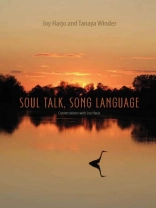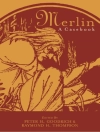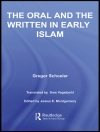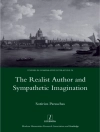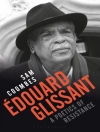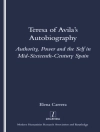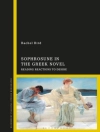<P>Joy Harjo is a ’poet-healer-philosopher-saxophonist, ’ and one of the most powerful Native American voices of her generation. She has spent the past two decades exploring her place in poetry, music, dance/performance, and art. Soul Talk, Song Language gathers together in one complete collection many of these explorations and conversations. Through an eclectic assortment of media, including personal essays, interviews, and newspaper columns, Harjo reflects upon the nuances and development of her art, the importance of her origins, and the arduous reconstructions of the tribal past, as well as the dramatic confrontation between Native American and Anglo civilizations. Harjo takes us on a journey into her identity as a woman and an artist, poised between poetry and music, encompassing tribal heritage and reassessments and comparisons with the American cultural patrimony. She presents herself in an exquisitely literary context that is rooted in ritual and ceremony and veers over the edge where language becomes music.</P>
Innehållsförteckning
<P>Foreword: A Carrier of Memory – Laura Coltelli<BR>Acknowledgments<BR>INTERVIEWS<BR>Becoming the Thing Itself, Interview with Triplopia<BR>Music, Poetry, and Stories: Returning to the Root Source, Interview with Rebecca Seiferle<BR>Exploring the Depths of Creation and Meaning, Interview with Simmons Buntin<BR>The Thirst for Artistic Brilliance, Interview with Pam Kingsbury<BR>In the Horizon of Light with Joy Harjo, Interview with Ruben Quesada<BR>Writing, Constructing the Next World, Interview with Bill Nevins<BR>Transcending Writing on Singing Wings, Interview with Tanaya Winder<BR>Song Language: Creating from the Heart, Out, Interview with Loriene Roy<BR>You Might as Well Dance, Interview with Harbour Winn, Elaine Smokewood, and John Mc Bryde<BR>The Craft of Soul Talk, Interview with Susan Thornton Hobby<BR>COLUMNS BY JOY HARJO<BR>Global Roots, Muscogee Nation News, October 2006<BR>Identity, Muscogee Nation News, December 2006<BR>Censorship and the Power of Images, Muscogee Nation News, May 2007<BR>It’s Difficult Enough to Be Human, Muscogee Nation News, June 2007<BR>Dehumanization Flatlines, Muscogee Nation News, August 2007<BR>We Are Story Gatherers, Muscogee Nation News, June 2008<BR>We Are the Earth, Muscogee Nation News, August 2009<BR>A Way to Speak Their Souls, Muscogee Nation News, February 2010<BR>Energy of the Transaction, Muscogee Nation News, April 2010<BR>Watching the World Shift, Muscogee Nation News, July 2010<BR>THE LAST WORD: PROSE PIECES BY JOY HARJO<BR>Preface for She Had Some Horses, From the second edition, W.W. Norton, 2009<BR>The Art of Resistance, Preface for Indigenous People’s Journal of Law, Culture and Resistance, 2004<BR>Afterword for The Delicacy and Strength of Lace, From the second edition, Graywolf Press, 2009<BR>In Honor of Patricia Grace, World Literature Today, May–June 2009<BR>I Used to Think a Poem Could Become a Flower, Introduction to Ploughshares, December 2004<BR>Talking with the Sun, From This I Believe, July 2007<BR>About the Authors</P>
Om författaren
<P>JOY HARJO became the first Native American to be named Poet Laureate of the United States in 2019. She is a multitalented artist of the Mvskoke/Creek Nation. She is an internationally known poet, performer, writer, and musician. She has published seven books of acclaimed poetry including She Had Some Horses, In Mad Love and War, The Woman Who Fell from the Sky, and How We Became Human: New and Selected Poems. She has produced five award-winning albums of music and poetry including Letter from the End of the Twentieth Century, Winding through the Milky Way, and Red Dreams: A Trail Beyond Tears. She lives in Albuquerque, New Mexico. TANAYA WINDER is a poet from the Duckwater Shoshone and Southern Ute nations. She is pursuing an MFA in poetry from University of New Mexico and working on her first collection of poetry. LAURA COLTELLI is a professor of American literature at the University of Pisa, Italy. Her publications include Winged Words, American Indian Writers Speak, and an edited collection of essays, Reading Leslie Marmon Silko.</P>
